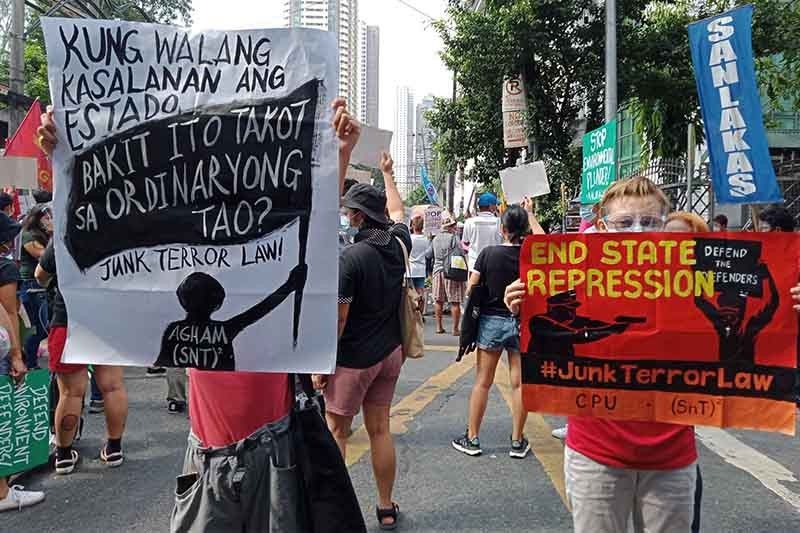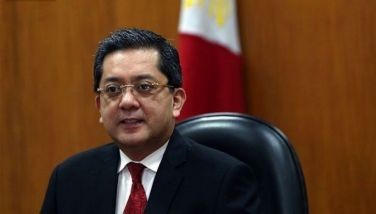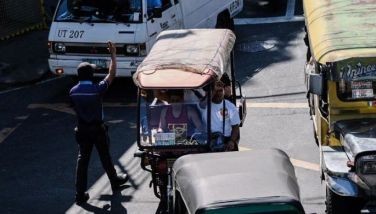Petitioners assert to SC: There is no saving anti-terrorism law for its vagueness

MANILA, Philippines (Updated 7:28 p.m.) — Petitioners against the Anti-Terrorism Act of 2020 asserted before the Supreme Court that the law’s definition of terrorism is overly vague that no amount of jurisprudence can save it.
The SC on Tuesday held the highly anticipated oral arguments on the 37 petitions challenging the contentious Republic Act 11479 or Anti-Terrorism Act of 2020.
FOLLOW: LIVE: Oral arguments on petitions vs the anti-terrorism law
All the petitions are assailing Section 4 of the law, which defines terrorism. They said the provision is void for its vagueness and is overbroad, which gives authorities unbridled discretion on how to interpret it.
Terrorism as a new, drastic phenomenon
Associate Justice Rosmari Carandang, who was first to interpellate, asked Rep. Edcel Lagman (Albay) on when the word terrorism or the crime of terrorism entered the Philippines statute books.
She then referred to Section 29 of the law, which allows detention of suspected terrorists, without a judicial warrant, of up to 24 days. This, while Article VII Section 18 of the Constitution states that during the suspension of the writ of habeas corpus, a person may be arrested and shall be judicially charged within three days, otherwise he will be released.
“Are we safe to say that since terrorism was not in the mind yet or not a crime punishable when the 1987 Constitution was passed, can it not be said that this article on the three-day detention on Habeas Corpus does not strictly apply to acts of terrorism?” the justice asked.
Lagman responded: “We cannot subscribe to that Your Honor because the provision of the Constitution is omnibus. It would cover all possible crimes.”
The lawmaker pointed that this even covers when Martial Law has been declared.
RELATED: Carpio warns: Situation 'worse than martial law' under anti-terrorism law
Carandang pressed that since terrorism is a “new phenomenon” that involves the security of the entire nation, cannot the Congress legislate longer period than what is held in Article 125 of the Revised Penal Code, which provides that authorities must bring detained persons to judicial authority within, at most, 36 hours.
Lagman however stressed that “the Congress cannot derogate the protection of civil liberties and other fundamental freedoms.”
“Congress cannot pass a law against terrorism by derogating civil and political rights safeguarded in the Constitution. But in the case of the ATA, it has put the war against terrorism in a pedestal while it has demoted civil liberties to a footstool,” he added.
Law beyond saving
Senior Associate Justice Estela Perlas-Bernabe, during her interpellation, asked Free Legal Assistance Group chairman Chel Diokno whether Section 4 of the law was a “novel creation of the Congress.”
Diokno said Solicitor General Jose Calida claimed that it was patterned after international standards, such as the proposed convention on the international terrorism initially submitted by India to the United Nations in 1996.
But he pointed out that the ATA had significant differences from the said proposed convention, such as the latter mentioning acts that cause death or damage to property, which means actual death and destruction is needed.
In the Philippines’ anti-terrorism law, it punishes acts “intended to” cause death or bodily injury.
Bernabe noted that the Congress is not required to define every word or term when it enacts a penal statute.
Diokno then said that while not every word should be defined, “operative words that give rise to the essential elements of the crime made by congress must be understood.”
Bernabe then gave the petitioners a scenario when a person comes up with a plan to bomb a government infrastructure, provides funds weaponry and plan was later accomplished. "Can this person be both punished under Sec. 6 by facilitating terrorism and Sec. 12 by providing material support? Do you think there is an overlap?"
Diokno replied in the affirmative and noted that the person can also be charged with violation of Section 4 of the law.
Bernabe pressed whether the person may also be held liable under Section 7 of the law which punishes conspiracy to commit terrorism. "So a single act can now be penalized under Sec. 6 facilitation, Sec. 7 conspiracy to commit terrorism, or Sec, 12 providing material support under ATA,"s she asked, and Diokno answered again in the affirmative.
"Can the court clarify the interrelation of these offenses through jurisprudence and also the proper application for criminal prosecution?" Bernabe asked.
Diokno said that while this may be possible for other laws, this is not the case with the Anti-Terrorism Act.
"We submit that as far as this law is concerned even the very nebulous overbroad vague definition of terrorism, we submit that no amount of construction by the court can save it," he added.
Aside from Perlas-Bernabe and Carandang, only Associate Justice Marvic Leonen were able to pose their questions to the petitioners. Solicitor General Calida has also yet to present the government’s defense.
The SC will resume the oral arguments on February 9.
President Rodrigo Duterte signed the Anti-Terrorism Law on July 3 despite opposition from rights groups and civil society groups that it could be used to stifle human rights.
A petition against the law has been filed at the Supreme Court and other groups are preparing pleadings of their own.
Follow this page for updates. Photo courtesy of The STAR/Michael Varcas
National Security Adviser Hermogenes Esperon moves to block access to several websites, including news sites of alternative news orrganizations Bulatlat.com and Pinoyweekly.org.
In his letter to the National Telecommunications Commission, he only says the websites are "affiliated to and are supporting these terrorists and terrorist organizations."
No other basis to back up his allegation was cited in the letter.
Citing the designation of the CPP-NPA-NDF as terrorists, NSA Hermogenes Esperon moves to block access to several sites.
— Kristine Patag (@kristinepatag) June 22, 2022
In Esperon's letter to the NTC, he included news sites @bulatlat and @pinoyweekly; sites of other progressive groups RMP and Save our Schools. @PhilstarNews pic.twitter.com/nAzMITJFsS
The Commission on Human Rights says it "partly welcomes" the Supreme Court decision that some parts of the controversial Anti-terrorism Law are unconstitutional.
CHR spokesperson Jacqueline de Guia says the commission remains hopeful that the remaining contentious provisions of the law will be clarified by the high cour in the full text of the decision.
"At the same time, our commitment remains in guarding against possible human rights violations arising from the implementation of the anti-terror law. We steadfastly remind the government that countering terrorism and protecting human rights are not competing values but are, in fact, mutual and complementary," De Guia says in a statement.
The Supreme Court has deliberated and voted on the controversial Anti-Terrorism Act but the decision will be released "at the soonest time possible."
"However, considering that there were numerous issues resolved in the case, as well as the fact that each Justice had to vote on each issue, there is a need to accurately confirm and tally the vote of each Justice in order to ensure the correct resolution of the Court per issue," SC spokesperson Brian Hosaka says.
The Anti-Terrorism Council designates the National Democratic Front of the Philippines, the panel that negotiates for communist rebels during peace talks a terrorist organization.
Previous designation of the Communist Party of the Philippines and New People's Army led to the designation of supposed members of the CPP's Central Committee. Among those designated as terorrists were peace consultants.
Designation gives the Anti-Terrorism Council the authority to investigate and freeze the accounts of designated persons.
The Anti-Terrorism Council has designated 29 people, including alleged members of the Communist Party of the Philippines-New People's Army, as terrorists in two resolutions.
Designation allows the Anti-Money Laundering Council to freeze the assets of those on the list.
- Latest
- Trending





























